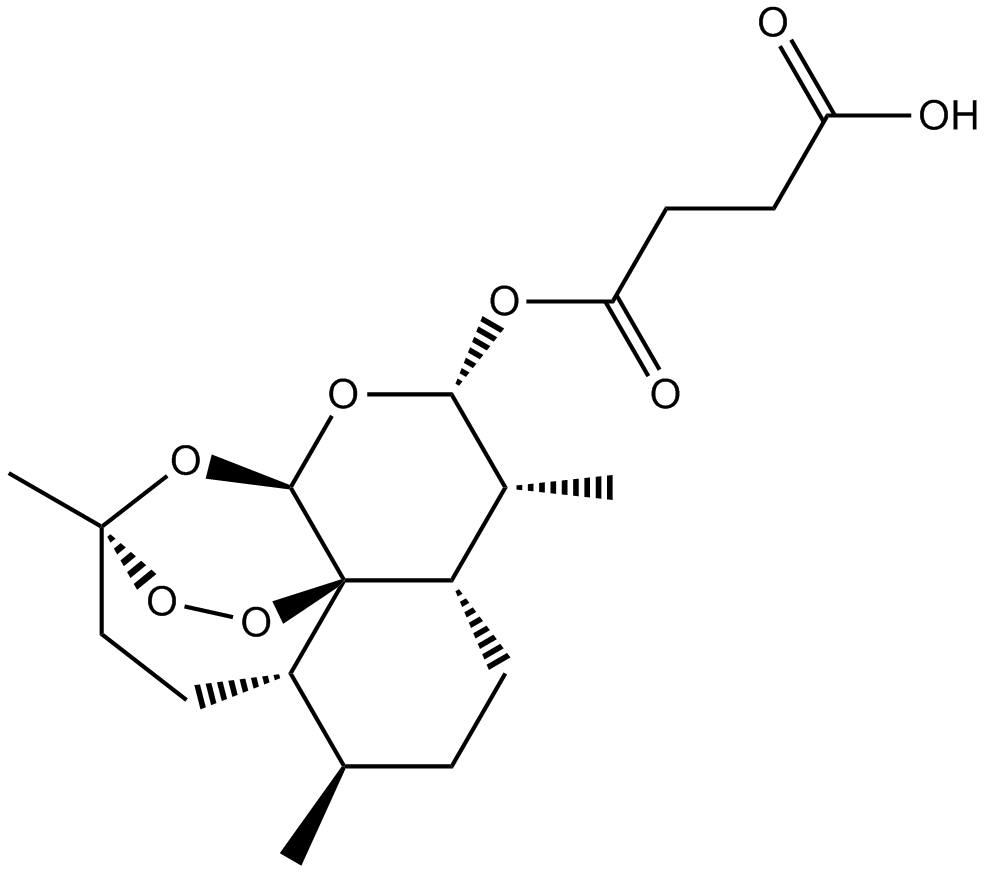Artesunate (Synonyms: Artesunic Acid, NSC 712571, WR 256283) |
| Katalog-Nr.GC10889 |
Ableitung des Naturprodukts Artemisinin
Products are for research use only. Not for human use. We do not sell to patients.

Cas No.: 88495-63-0
Sample solution is provided at 25 µL, 10mM.
Artesunate is an antimalarial compound and an inhibitor of signal transducer and activator of transcription 3 (STAT-3) and membrane glutathione S-transferase (EXP1) [1, 2]. Artesunate is a sesquiterpene lactone with anti-tumor, anti-inflammatory, anti-fibrotic, and antiviral activities [3].
In vitro, treatment of gastric cancer cell line SGC-7901 cells with artesunate (0, 30, 60, 120 mM) for 24 h significantly increased the cell apoptosis rate, Bax and Caspase-3 protein expression levels, and significantly reduced the cell proliferation index, CDC25A, Bcl-2 protein expression, and mitochondrial membrane potential [4]. Treatment of human glioma cells LN-229 with artesunate (5-50 μg/mL) induced apoptosis and necrosis, DNA oxidative damage, and a continuous increase in DNA double-strand breaks, causing a dose-dependent increase in the levels of phosphorylated ATM, ATR, Chk2, and Chk1 [5].
In vivo, Artesunate (50 mg/kg) was intraperitoneally injected into mice transplanted with ovarian cancer cells (A2780 and HO8910 cells) for 16 days. Treatment alone had no significant effect on the growth of both transplanted tumors, while the tumor growth of the group treated with cisplatin was significantly slowed down[6]. Artesunate (200 mg/kg) was orally treated with mice infected with Plasmodium berghei, which significantly reduced the number of congested capillaries, endothelial cell thickness, and detachment of leukocytes from the vascular wall in brain slices, and reduced the expression of TNF-α in brain tissue [7].
References:
[1] Ilamathi M, Santhosh S, Sivaramakrishnan V. Artesunate as an anti-cancer agent targets stat-3 and favorably suppresses hepatocellular carcinoma[J]. Current topics in medicinal chemistry, 2016, 16(22): 2453-2463.
[2] Lisewski A M, Quiros J P, Ng C L, et al. Supergenomic network compression and the discovery of EXP1 as a glutathione transferase inhibited by artesunate[J]. Cell, 2014, 158(4): 916-928.
[3] Shi M, Yang X. Research Progress on Anti-tumor Mechanism of Artesunate Combined Drugs[J]. Academic Journal of Science and Technology, 2024, 10(1): 197-201.
[4] Wang L, Liu L, Wang J, et al. Inhibitory effect of artesunate on growth and apoptosis of gastric cancer cells[J]. Archives of medical research, 2017, 48(7): 623-630.
[5] Berdelle N, Nikolova T, Quiros S, et al. Artesunate induces oxidative DNA damage, sustained DNA double-strand breaks, and the ATM/ATR damage response in cancer cells[J]. Molecular cancer therapeutics, 2011, 10(12): 2224-2233.
[6] Wang B, Hou D, Liu Q, et al. Artesunate sensitizes ovarian cancer cells to cisplatin by downregulating RAD51[J]. Cancer biology & therapy, 2015, 16(10): 1548-1556.
[7] Souza M C, Paixao F H M, Ferraris F K, et al. Artesunate Exerts a Direct Effect on Endothelial Cell Activation and NF‐κB Translocation in a Mechanism Independent of Plasmodium Killing[J]. Malaria research and treatment, 2012, 2012(1): 679090.
Average Rating: 5 (Based on Reviews and 34 reference(s) in Google Scholar.)
GLPBIO products are for RESEARCH USE ONLY. Please make sure your review or question is research based.
Required fields are marked with *




















